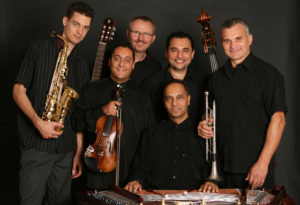Kalman Balogh
Dulcimer pure
Kálmán Balogh is an exceptional musician, one of the most notable cimbalom players in the world. He has toured extensively in Europe and in North America to critical acclaim. Balogh has traveled to remote villages and studied the indigenous music of the Roma and Hungarian people. His cimbalom artistry was featured in numerous major European festivals and on classical concert stages. >>>

“You can feel the audience holding their breath as Balogh cranks up the pace and the hammers just skate at lightening speed across those strings”-

Kálmán Balogh is one of the foremost Hungarian cimbalom players, descending from a famous dynasty of Hungarian Gypsy musicians. His virtuosity is matched only by his understanding and respect of his heritage. A graduate of Ferenc Liszt Academy of Music of Budapest, he has completed many successful tours throughout the world with various ensembles, including ten tours in North America.
The cimbalom, a sort of oversized hammer dulcimer played with mallets like a vibraphone, possesses piano like percussive abilities to drive a band rhythmically or take the melodic lead.
In Kálmán Balogh’s expert hands, the cimbalom can do both simultaneously. His mastery of this unique and rare Hungarian folk instrument has mesmerized audiences.

Kálmán Balogh and the Gypsy Cimbalom Band, Live in Germany
Music does not respect borders. It flows across them like honey. And it flows forever, never still. The Slovak cowherd falls is love with a Hungarian speaking maid and moves to her village, bringing his songs with him. A Rom (Gypsy) musician in rural Transylvania plays a Jewish wedding in the 1920’s and carries that style forward, to mix with Saxon German and Romanian tunes, and whatever else is encountered in the meantime. There is no barbed wire, no moat, no guards that can stop a song from getting through. No army ends the march of a song: instead the troops will end up transporting it, willingly or not, whether they know it or not, wherever they campaign. Even if they all perish, the song will survive.

The rich collection of musical materials from Kálmán Balogh ’s latest album is a living illustration of this endless motion of music. In the course of ten tracks Balogh references a dizzying array of styles and approaches, from the flamboyantly virtuosic to the introspective, and from Balkan wedding music to Latin jazz. Here traditional Gypsy fiddling meets soft jazz trumpet while Hungarian, Macedonian, and Romanian tunes join together in a round dance, with Brahms and Liszt and even Bach peering out here and there.
This album also demonstrates the tendensy of leading musicians to make their own path. Kálmán Balogh has at least two astonishing gifts. The first is the most obvious, an uncanny control and power performing on his instrument. The subtlety of his touch is legendary, as are the different roles his instrument plays: now accompanist, now a wild soloist, here expressive, there percussive. This breadth is the key to this second gift, that of stretching his core repertoire in manifold directions and in doing so reinventing his instrument. The search for some notion of historic or stylistic authenticity would be here misplaced. The only authenticity of his unerring musical instincts.
Kálmán Balogh’s background and training render him an ideal musical personality to achieve such synthetic goals. He was born in Miskolc in North-Eastern Hungary in 1959 and started to play the cimbalom at the age of 11. His first teacher was his uncle, Elemer Balogh, who is musically remembered in the first part of Track 6. While this rich training in the oral tradition shaped his flair and the excellence of this ear, he supplemented this approach with classical studies, graduating from The Liszt Ferenc Academy of Music in Budapest. Hungary is the only country in the world that has offered advanced music degrees in cimbalom study, and this combination of traditional and „classical” training marks Balogh’s free range, and also his remarkable control. He has become recognized as one of the world’s leading cimbalom players, and many is the aspiring young player who poudly identifies themselves as having studied with Kálmán Balogh. He has played with most of the leading traditional music groups in Hungary, and continues his career as a traveling virtuoso.
The instrument he plays traces its modern invention back to the last three decades of the 19th century, but it existed in many other forms for centuries. Today the instrument resembles nothing so much as a thick trapezoidal wooden table with sets of strings on its surface running at seemingly dizzying diagonals, the whole held aloft by trunklike legs. Today’s cimbalom has about 125 metal strings with 3 to 5 strings per note. But this powerful, tightly strung instrument was originaly a much smaller, portable one which the strolling player suupported with a strap around their neck. Examples of this can be seen throughout the region, from Moravia to Bulgaria, and other variants of this genus are the hammered dulcimer of the Appalachians. Like pianos, accordions, and guitars, the cimbalom has always been a marvelously versatile creation and an essential part of a band. It can whisper like the wind, or carry the force of a musical machine gun. It plays gentle chords, and outlines the harmony, but can take a solo like no one’s business. It supports forward motion with bold basslines, but its rolled chords, its glorious arpeggios, are perhaps the hallmark of its identity. All of these sounds and styles, and more, can be heard on Kálmán Balogh’s innovative new album.
Michael Beckerman, 2007
(Professor of Music and Chair of the Department of Music atNew York University)
Highlights:
Kalman Balogh 60, Franz Liszt Academy, 30. 10. 2019. 19:30-22:00
Kálmán Balogh last gave a most memorable concert entitled 40 Years on Stage in the Liszt Academy in 2015. Now, on the occasion of his birthday, he presents this more than four decades compressed into a single concert. Retrospectives and summaries always present artists with a great challenge because what was at one time innovative may be clichéd today; quite often, untrodden paths turn, with the passage of decades, into toll highways. Balogh Kálmán created a new style by building bridges between different music styles. His professional knowledge and artistic sensibilities, spiced up with a little ‘ethno-sauce’, have made him a legendary performer worldwide. At the beginning of the concert he evokes Béla Bartók with the assistance of Ágnes Herczku and Zoltán Juhász, as well as classical cimbalom player András Szalai. In the second half the emphasis is on folk music played in its original form. We journey through parts of the Central-Eastern European region where the cimbalom has become part of the music tradition. Fellow musicians and students help conjure up the finest musical moments of the past 60 years.
Repertoire:
Hungarian Folk Songs collected by Béla Bartók
Bartók: Three Hungarian Folksongs from Csík, BB 45b
Remembrance to Géza Allaga and Aladár Rácz
Couperin: Les rozeaux
Scarlatti: Keyboard Sonata in G major, K. 13
Improvisations on Folk Songs
Balkan Folk Music
intermission
Folk Dances from Gömör and Transdanubia
Music from Gyergyó collected by Kodály
Folk Music from Bonchida
Featuring:
Kálmán Balogh (cimbalom)
Miklós Lukács, Dániel Szabó, András Szalai, Ferenc Zimber (cimbalom), János Gelencsér (cimbalom, violin)
Branka Básits, Ágnes Herczku, Ágnes Szalóki (vocals)
Balázs Vizeli (violin), Péter Árendás (viola), Róbert Doór (double bass)
Zoltán Juhász (recorder)
Gipsy Cimbalom Band: Péter Bede (saxophone), Ferenc Kovács (trumpet, violin, vocals), Frankie Látó (violin), Csaba Novák (double bass), Mihály György (guitar)
April 2019. Budapest, Várkert Bazár

World-famous cimbalom player Kálmán Balogh and the band of his choice will present two UNESCO cultural heritage listed Romanian traditions, the Doina and the Kaluser. The latter is an initiation rite, a dance of legendary virtuosity, which will be performed by the Dezső Fitos Company.
The PONT Festival presents traditions, customs, dances, and flavours from Hungary and the Balkans, treasures from UNESCO’s list of cultural heritage. From the morning, there will be interactive activities for the family, with Vilmos Gryllus welcoming spring with his songs, and folk music and fairy tales setting the mood at another concert, Tune In.
At events throughout the day for the whole family, dances, artisanal traditions, and the gastronomy of the region will be introduced. Experts will teach the tricks of lacemaking, wood carving, and carpet making to visitors, who can also make masks and learn to dance the kolo.
March 2019
Week-end Budapest, Kàlmàn Balogh / Kàlmàn Balogh & le Gipsy Cimbalom Band
LIEU : Philharmonie 2 (Cité de la Musique) (Paris 75019)
HORAIRE : De 20:30 à 22:30
Kálmán Balogh est un des plus grands interprètes de cymbalum, un des instruments à corde majeurs de la tradition hongroise. Avec son groupe interprète les trésors du répertoire tzigane.
Le cymbalum, instrument à cordes sur table, est une pièce essentielle de la musique d’Europe centrale. Comparé au santur persan et au hackbrett germanique, il est composé de cent vingt-cinq cordes métalliques frappées par deux petits marteaux tenus par le musicien. Kálmán Balogh provient d’une des grandes familles d’interprètes de cet instrument qui garde encore à nos yeux une grande part de mystère. À travers les années, il a eu l’occasion d’exercer son art avec des groupes de jazz, de rock et des orchestres symphoniques. S’il est profondément fier de ces incartades dans d’autres styles, Kálmán Balogh pratique aujourd’hui exclusivement la musique traditionnelle tzigane, qu’il fait vivre et transmet avec délicatesse et passion. Il se produit ici avec son groupe, le Gipsy Cimbalom Band.

February 2019. Cziffra Festival, Budapest
The Catharsis
Roundtable discussion and cimbalom concert
Participants: Eszter Nagy-Kálózy, Tamás Freund, János Lackfi, Miklós Lukács and Kálmán Balogh
„The music experience is guaranteed by two outstanding performers: Kálmán Balogh and Miklós Lukács are the unruly kings of the cimbalom game not only at home, but all over the world. If it is not catharsis, but in any case it is a surprise that we only hear the cimbalom at the fourth Cziffra Festival, since Cziffra’s father, older György Cziffra, was a master of this almost unknown virtuos and sensitiv instrument.”
